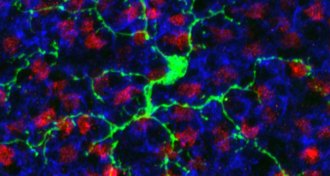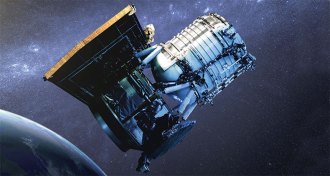All Stories
-
 Genetics
GeneticsMummy DNA unveils the history of ancient Egyptian hookups
A study of DNA extracted from Egyptian mummies untangles ancient ancestry and attempts to resolve quality issues.
-
 Health & Medicine
Health & MedicineSome topics call for science reporting from many angles
There’s heartbreak in this issue. Science News investigates different facets of the ongoing opioid epidemic in the United States.
-
 Particle Physics
Particle PhysicsReaders puzzled by proton’s properties
Readers sent feedback on under-ice greenhouses in the Arctic, the Martian atmosphere and more.
-
 Health & Medicine
Health & MedicineFor babies exposed to opioids in the womb, parents may be the best medicine
A surge in opioid-exposed newborns has U.S. doctors revamping treatments and focusing on families.
By Meghan Rosen -
 Health & Medicine
Health & MedicineResearchers stumble onto a new role for breast cancer drug
At first, ophthalmologist Xu Wang thought her experiment had failed. But instead, she revealed a new role for the breast cancer drug tamoxifen — protection from eye injury.
-
 Archaeology
ArchaeologyPeru’s plenty brought ancient human migration to a crawl
Ancient Americans reached Peru 15,000 years ago and stayed put, excavations suggest.
By Bruce Bower -
 Health & Medicine
Health & MedicineThe opioid epidemic spurs a search for new, safer painkillers
Today’s opioids stop pain — but they’re also dangerous. Scientists are hunting for replacements.
-
 Paleontology
PaleontologySea scorpions slashed victims with swordlike tails
Ancient sea scorpion used a flexible, swordlike tail to hack at prey and defend against predators.
-
 Planetary Science
Planetary ScienceWhy you can hear and see meteors at the same time
People can see and hear meteors simultaneously because of radio waves produced by the descending space rocks.
-
 Planetary Science
Planetary ScienceCitizen scientists join the search for Planet 9
Backyard Worlds: Planet 9, a citizen science project, lets space enthusiasts search for undiscovered objects in the sky, including a hypothesized planet at the far reaches of the solar system.
-
 Science & Society
Science & SocietyTrump’s proposed 2018 budget takes an ax to science research funding
Administration would cut total federal research spending by about 17 percent, according to a preliminary estimate.
-
 Psychology
PsychologyRunning is contagious among those with the competitive bug
Can behaviors really be contagious? Runners log more miles when their friends do — especially if they want to stay leader of the pack, a new study finds.